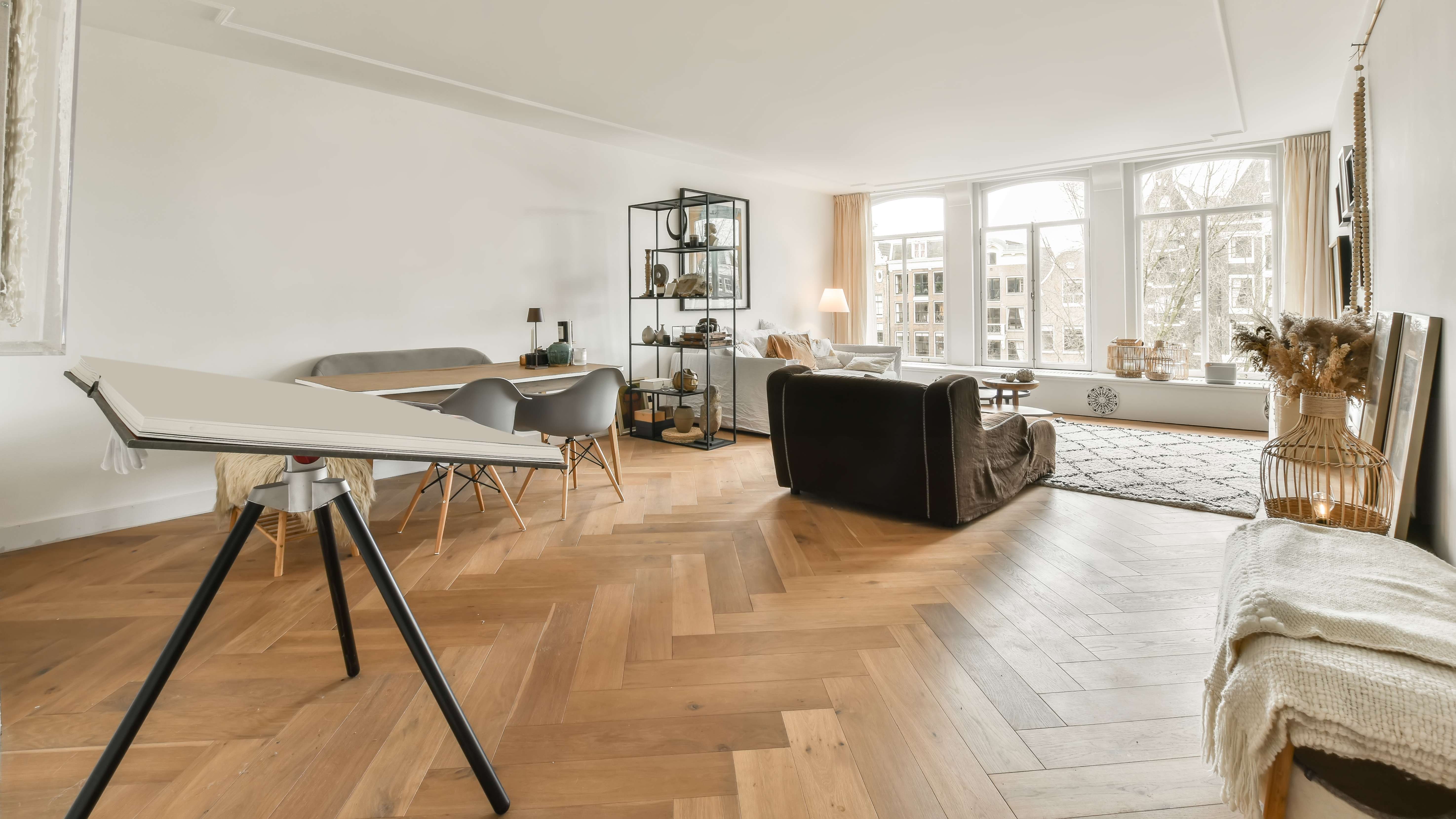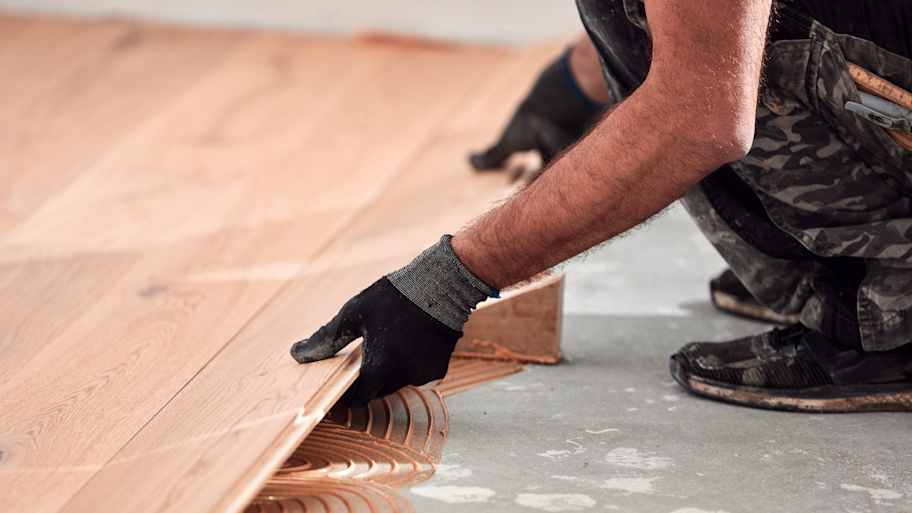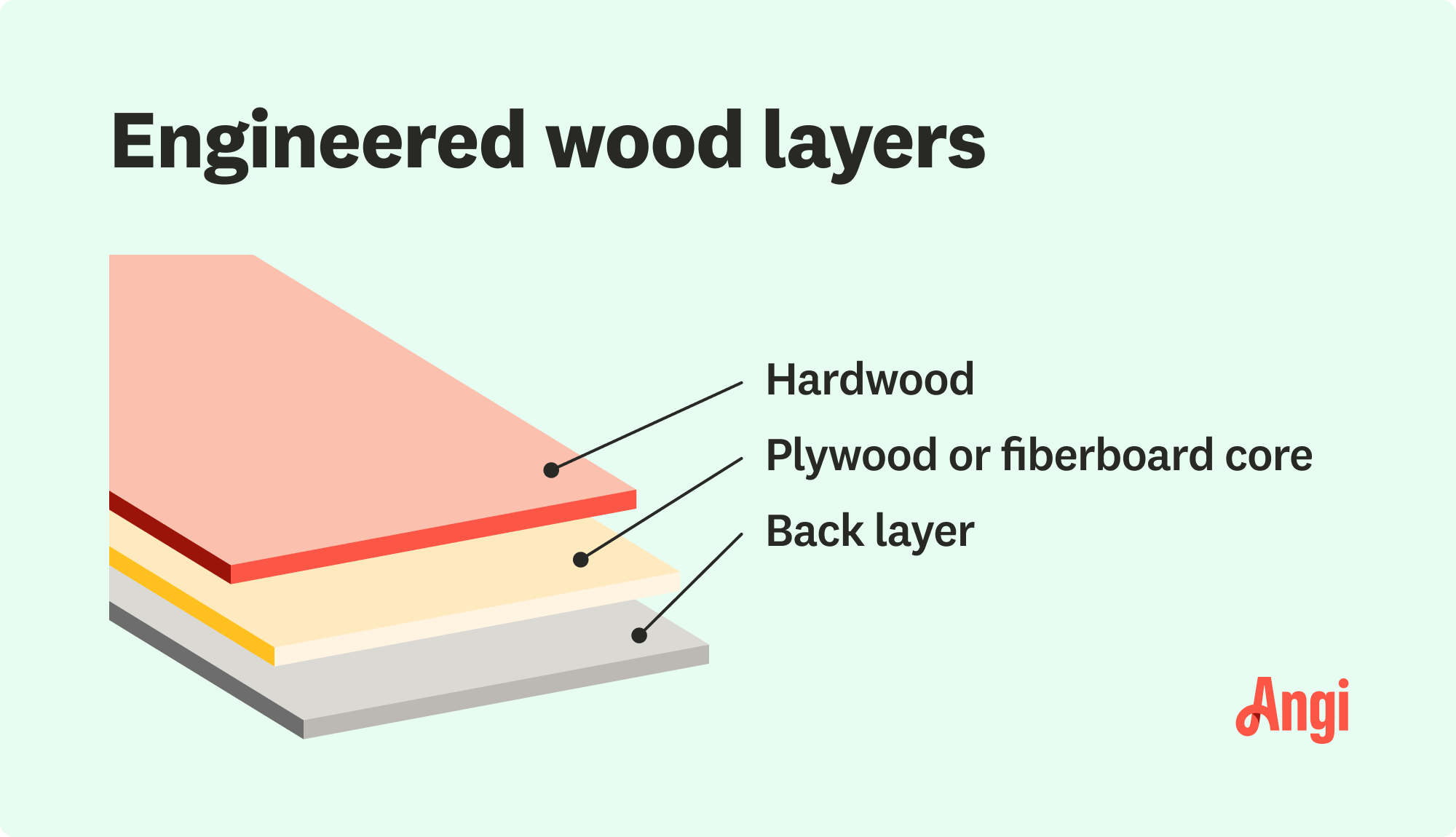
Here’s what you should expect to pay when renting an orbital, drum, vibrating, or edging floor sander—as well as where you can rent them and what else to know.
The cost to install engineered wood floors is $4,750 on average, but it ranges from $2,000 to $7,000. The wood quality, materials, and labor impact the price, so call a pro for a quote.


The price depends on the wood grade, size, species, and the total scope of the project.
Labor makes up 50% of the cost of engineered wood floor installation.
Hardwood flooring comes with a 118% ROI, and the value of engineered wood depends on the local market.
You can only refinish engineered hardwood a couple of times before it needs a replacement.
The cost to install engineered hardwood flooring is $4,750 on average, with most homeowners spending between $2,000 and $7,000. The total cost depends on a number of factors, like the type and grade of wood, along with the size of the space and the local cost of labor. Budget anywhere from $7 to $20 per square foot, fully installed.
If you want the look of hardwood flooring at a fraction of the cost, engineered hardwood is a winning favorite. This type of flooring has a hardwood veneer backed with multiple layers of plywood or fiberboard, which keeps it durable and helps lower the cost. Set a solid floor for your budget as you take on this project.
The cost to install engineered hardwood is $7 to $20 per square foot, including materials and labor. In other words, your project total largely depends on the size of the floor you want to install. Most homeowners replace the flooring in a single room or a couple of rooms, but you’ll spend notably more if you’re installing flooring throughout your entire home.
| Room Type | Floor Size (Per Sq. Ft.) | Average Cost |
|---|---|---|
| Laundry room | 50–100 | $350–$2,000 |
| Bathroom | 50–160 | $350–$3,200 |
| Bedroom | 100–300 | $700–$6,000 |
| Living room | 200–400 | $1,400–$8,000 |
| Whole house | 1,500–3,000 | $10,500–$60,000 |

Like other types of hardwood flooring, the cost of engineered hardwood depends on the species. Most of these floors cost $3 to $16 per square foot (for the wood only). Harder or rarer woods cost more than softer or common woods.
| Wood Type | Cost (Per Sq. Ft.) |
|---|---|
| Bamboo | $2–$6 |
| Heart pine | $2–$5 |
| Red oak | $2–$6 |
| Acacia | $3–$8 |
| Maple | $3–$10 |
| Cypress | $4–$6 |
| White oak | $4–$7 |
| White ash | $4–$8 |
| Cherry | $4–$10 |
| Mahogany | $6–$8 |
| Teak | $9–$13 |
Bamboo: Engineered bamboo plants cost $2–$6 per square foot. This budget-friendly option is considered more eco-friendly and resistant to pests like termites.
Heart pine: Engineered heart pine (or longleaf pine) planks cost $2–$5 per square foot. This budget-friendly option has an attractive, defined grain. Since it’s softer than other hardwoods, it can be prone to denting, but it’s still durable enough to use in high-traffic areas like a living room.
Red oak: Engineered red oak planks cost $2–$6 per square foot and are favored for their high durability and distinctive color.
Acacia: Engineered acacia planks cost $3–$8 per square foot. This wood is less likely to warp because it has a natural wax coating that helps repel water and pests. It also comes in various shades.
Maple: Engineered maple planks cost $3–$10 per square foot. It’s a popular option for high-traffic areas like front entryways, living rooms, and hallways.
Cypress: Engineered cypress planks cost $4–$6 per square foot. This is an uncommon type of engineered wood flooring, but it’s termite-resistant.
White oak: Engineered white oak planks cost $4–$7 per square foot. This is a great choice for mud rooms or entryways because it’s slightly more water-resistant than red oak and comes in a lighter color.
White ash: Engineered white ash planks cost $4–$8 per square foot. This type of wood is known for its cream to grayish-brown color and signature grain. Since it’s softer than other hardwoods, it’s easier to cut, which can lower installation costs.
Cherry: Engineered cherry planks cost $4–$10 per square foot. This type of wood is popular for its unique red-brown tone and is also one of the most durable options.
Mahogany: Engineered mahogany planks cost $6–$8 per square foot. Though it costs more than other woods, homeowners love the rich tone.
Teak: Engineered teak planks cost $9–$13 per square foot. This type of wood is extremely durable and scratch-resistant. It’s a staple of midcentury modern design and commonly found in homes built in the 1950s to 1970s.
When choosing engineered hardwood planks, you need to pay attention to the grade. This will help you weigh the price versus the durability. There are three major grades of engineered wood: basic, mid-grade, and high-end. Basic is the least durable and most affordable, while high-end is the most durable and least affordable.
| Wood Grade | Cost (Per Sq. Ft.) |
|---|---|
| Basic | $5–$9 |
| Mid-grade | $6–$12 |
| High-end | $13–$20 |
Basic engineered wood: At $5–$9 per square foot, basic engineered wood is the least costly grade. This is the type of hardwood used for an average project. It has three core layers with a veneer that’s 1/16 to 1/12 inch thick.
Mid-grade engineered wood: Mid-grade engineered hardwood costs $6–$12 per square foot. The core and veneer are thicker, making this one of the best types of flooring for people with children or pets because it can better resist scratches.
High-end engineered wood: High-end engineered wood costs $13–$20 per square foot. Its core has seven or more layers, and the veneer is at least 1/6-inch thick, making it the most durable (and expensive) option.
The width of your wood floor plank will impact the price. Though wider planks cost more up front, you’ll need fewer of them to fill your space, decreasing labor costs. Most engineered hardwood planks measure 5 inches wide or less, but you can purchase specialty planks that are 6 to 12 inches wide and cost $5 to $18 per square foot.
Just as you’d pay more for a thicker veneer, you’ll also pay more for a thicker plank. Planks come in three common sizes. The thicker the plank, the greater the durability.
| Thickness (Inches) | Cost (Per Sq. Ft.) |
|---|---|
| 5/16 | $2–$5 |
| 3/4 | $3–$10 |
| 7/8 | $5–$15 |

Once you choose the best type of flooring for your home, there will be a few additional installation costs.
Labor amounts to about 50% of the cost to install engineered hardwood flooring. Most flooring contractors charge $3 to $10 per square foot, but some charge an hourly rate of $60 to $80 per hour, depending on the installation.
If you’re replacing your floor, you’ll need to remove the old flooring and make any necessary repairs to the floor's structure, which adds extra costs.
| Job to Prep Floor | Average Cost |
|---|---|
| Carpet removal | $150–$250 |
| Floor removal | $200–$1,000 |
| Joist repair | $350–$1,000 per joist |
| Subfloor replacement | $900–$3,000 |
| Subfloor repairs | $2–$10 per sq. ft. |
Carpet removal: Carpet removal costs $150–$250 for most homeowners, but you could pay more than $700 to remove carpet across your entire home.
Floor removal: Removing old flooring, like engineered hardwood or laminate, costs anywhere from $200–$1,000, depending on the size of the floor.
Joist repair: If your floor joists show signs of damage, mold, or pest infestation, you may need to make repairs before you can install your floor. Floor joist repair averages $350–$1,000 per joist.
Subfloor repair or replacement: If your subfloor is damaged or sagging, you might need to repair or replace it before you can install your engineered wood planks. Subfloor replacement costs $900–$3,000, and subfloor repairs average $2–$10 per square foot.
If you didn’t install finished planks, you’ll want to finish your engineered hardwood flooring with a protective coating to prevent scratches, dents, and water damage. Finishing costs around $2 to $7 per square foot.
Water damage can cause serious problems for flooring, such as warping, staining, and mold growth. If you suspect water damage is an issue, a flooring pro can diagnose the cause, make necessary repairs, and restore the integrity of your floor.
For the most part, maintenance for engineered wood floors involves regular cleaning, which you can do with the products underneath your kitchen sink. Though engineered hardwood floors last 20 to 30 years, you may also want (or need) to make repairs as they start to wear:
DIY repair kit: $20–$75
Plank replacement: $7–$20 per sq. ft. (or contractor minimum)
Floor refinishing: $3–$8 per sq. ft.
Installing your own engineered hardwood flooring costs around 50% less than if you hired a pro, but that’s only if you do it correctly. Improperly installed planks are more likely to crack, buckle, bow, and warp over time. This can create a hazard in your home, and you can end up spending more to fix it than if you had hired a contractor in the first place.
Certain types of flooring (like click-and-lock planks) are easier to DIY as long as you have experience with these types of projects. Everything else, especially when you start getting into the joists and subfloor, is best left to a wood flooring contractor near you.

Whether you repair or replace hardwood flooring depends on the extent and the type of damage. The good thing about engineered hardwood is that you can replace individual planks or refinish the hardwood veneer to make it look brand new. This is the best option as long as your flooring isn’t near the end of its 20- to 30-year lifespan and doesn’t have significant issues like mold or warping.
However, there is a limit to how much you can refinish engineered wood floors. You can only refinish the top layer a couple of times before the veneer wears too thin. If your flooring has a particularly thin veneer or widespread damage, you may not be able to refinish it at all, and a replacement might be necessary.
| Factor | Repair | Replace |
|---|---|---|
| Cost of repairs vs. new floor | Repair costs less than 30% of a replacement | Repair costs more than 50% of a replacement |
| Age of flooring | Less than 20 years old | More than 20 years old |
| Flooring condition | You can refinish the floor, and the underlying planks are in good condition | More than 50% of the floor has damage, or it can’t be refinished |
| Materials | You can replace damaged planks with matching planks | You can’t find planks that match the rest of your flooring |
| Water damage | Water damage is minor, and you can refinish the floor or replace single planks | Flooring is warped, bowed, sagging, or moldy |
Engineered hardwood floors come with a significant ROI. According to the National Association of Realtors®:
Installing new wood floors has a ROI of 118%
Refinishing hardwood floors has a ROI of 147%
That said, the value of engineered hardwood is dependent on the local market. If you live in a high-end area where most similar properties have natural hardwood flooring, your engineered hardwood won’t add as much value. If you live in an area where the houses have all kinds of flooring (think: luxury vinyl planking (LVP), laminate, and engineered hardwood), your engineered hardwood floors could retain a value similar to hardwood.
Engineered hardwood is an affordable alternative to natural hardwood flooring. Nonetheless, you can still shrink your budget with some careful planning. Use these tips to save:
Choose a mid-range plank: Durability is key, but you can lower costs by choosing a thinner veneer in a common wood species. Opt for a mid-grade wood that will last longer than the least expensive option, which may struggle to hold up in high-traffic areas.
Opt for wider planks: Narrow planks take more labor to install, raising costs. Opt for wider planks that your pro can install in less time. You can get ultra-wide planks that are more than 5 inches wide.
Do some of the work DIY: You may not be able to install your floor on your own, but there are some jobs you can do to cut down on professional labor. If you know how, you can remove your old flooring and take it to the dump and save on labor.
Search for a deal: Some contractors have deals with suppliers, so let them help you pick your floor. Big box stores also have sales, especially at certain times of the year.
Home is the most important place on earth, which is why Angi has helped more than 150 million homeowners transform their houses into homes they adore. To help homeowners with their next project, Angi provides readers with the most accurate cost data and upholds strict editorial standards. We extensively research project costs to develop the pricing data you see, so you can make the best decisions for you and your home. We rely on reputable sources, including the U.S. Bureau of Labor Statistics, academic journals, market studies, and interviews with industry experts—all to ensure our prices reflect real-world projects.
Want to help us improve our cost data? Send us a recent project quote to [email protected]. Quotes and personal information will not be shared publicly.
Great tile work Amazing! He level the entire floor. Nice work
He requested I review his service, so I am following through. This week was the second service. I told him that our particular needs were that the trash cans in the living room, kitchen, and my bedroom be emptied. I explained what should go in recycling and which should go in garbage bin...
Overall this experience was hugely disappointing and stressful. It also created great anxiety for me as the provider got quite violent in his oral communications with me and frankly I was fearful for my wellbeing. On Friday July 25, Kevin Granahan was one of 4 individuals I requested quotes...
Temur couldn’t have been more professional and meticulous in his work. Very reasonable pricing. Would hire again.
Star Light Construct is the best group of contractors I've ever worked with. They painted the apartment, stained the floors (and re-floored the closets) and did a bunch of carpentry work throughout the space. Unbelievably great service and excellent work. I will be rehiring them for the next...
We appreciated what Cetro Pro did for us as we had an inexpensive bidder start our project. After a week of prepping for painting and not properly site protecting we were nervous about the actual painting results. After the first room was finished and inspected it was apparent that only 1...
The job was scheduled to start on Monday, January 21, 2013 and Vinny came right on time. Vinny is not only nice, patient, and kind but he's really good at what he does. I had trouble deciding on what color stain, but Vinny helped with that and he picked an amazing color. He was very clean...
I have to say not having a kitchen for a couple months was not easy for me because I love to be in my kitchen and love to cook. What made the sacrifice worth it was now I have an amazing new kitchen that is perfectly customized to all my needs and desires! And it gorgeous! I have had so...
From average costs to expert advice, get all the answers you need to get your job done.

Here’s what you should expect to pay when renting an orbital, drum, vibrating, or edging floor sander—as well as where you can rent them and what else to know.

It’s impossible to keep floors damage-free over the years. Thankfully, the cost to refinish hardwood floors is far less than the price tag to replace them altogether.

Hardwood floor repair costs depend on the problem. This guide breaks down common costs based on factors like the type of problem, repair method, and whether you hire a pro or DIY.
Moisture and heat can cause buckled hardwood floors. Learn why this happens, how to prevent it, and what to do if your hardwood floor is buckling.

So long, floor flaws! Learn how to get scratches out of wood floors and reveal an inner beauty that’s waiting to impress.

Struggling to narrow down your project timeline when deciding whether to paint or refinish floors first? Here's how to figure out your next steps.